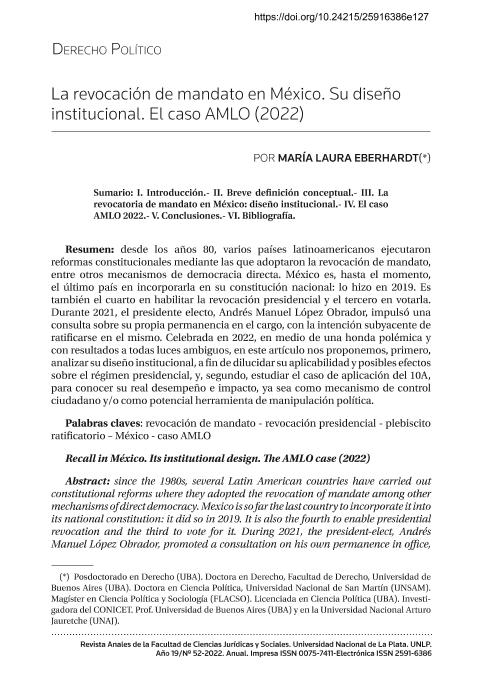Mostrar el registro sencillo del ítem
dc.contributor.author
Eberhardt, Maria Laura

dc.date.available
2023-07-31T17:53:23Z
dc.date.issued
2022-12
dc.identifier.citation
Eberhardt, Maria Laura; La revocación de mandato en México. Su diseño institucional: El caso AMLO (2022); Universidad Nacional de La Plata. Facultad de Ciencias Jurídicas y Sociales; Revista Anales de la Facultad de Ciencias Jurídicas y Sociales; 19; 52; 12-2022; 471-494
dc.identifier.issn
0075-7411
dc.identifier.uri
http://hdl.handle.net/11336/206214
dc.description.abstract
Desde los 80, varios países latinoamericanos ejecutaron reformas constitucionales mediante las que adoptaron la revocación de mandato, entre otros mecanismos de democracia directa. México es, hasta el momento, el último país en incorporarla en su constitución nacional: lo hizo en 2019. Es también el cuarto en habilitar la revocación presidencial y el tercero en votarla. Durante 2021, el presidente electo, Andrés Manuel López Obrador, impulsó una consulta sobre su propia permanencia en el cargo, con la intención subyacente de ratificarse en el mismo. Celebrada en 2022, en medio de una honda polémica y con resultados a todas luces ambiguos, en este artículo nos proponemos, primero, analizar su diseño institucional, a fin de dilucidar su aplicabilidad y posibles efectos sobre el régimen presidencial, y, segundo, estudiar el caso de aplicación del 10A, para conocer su real desempeño e impacto, ya sea como mecanismo de control ciudadano y/o como potencial herramienta de manipulación política.
dc.description.abstract
Since the 1980s, several Latin American countries have carried out constitutional reforms where they adopted the revocation of mandate among other mechanisms of direct democracy. Mexico is so far the last country to incorporate it into its national constitution: it did so in 2019. It is also the fourth to enable presidential revocation and the third to vote for it. During 2021, the president-elect, Andrés Manuel López Obrador, promoted a consultation on his own permanence in office, with the underlying intention of ratifying himself in it. Held in 2022, in the midst of deep controversy and with clearly ambiguous results, in this article we intend, first, to analyze its institutional design, in order to elucidate its applicability and possible effects on the presidential regime, and, second, to study the case of application of 10A, to know its real performance and impact, either as a mechanism of citizen control and/or as a potential tool of political manipulation.
dc.format
application/pdf
dc.language.iso
spa
dc.publisher
Universidad Nacional de La Plata. Facultad de Ciencias Jurídicas y Sociales
dc.rights
info:eu-repo/semantics/openAccess
dc.rights.uri
https://creativecommons.org/licenses/by-nc-nd/2.5/ar/
dc.subject
REVOCACIÓN DE MANDATO
dc.subject
MÉXICO
dc.subject
AMLO
dc.subject
REVOCACIÓN PRESIDENCIAL
dc.subject.classification
Ciencia Política

dc.subject.classification
Ciencia Política

dc.subject.classification
CIENCIAS SOCIALES

dc.title
La revocación de mandato en México. Su diseño institucional: El caso AMLO (2022)
dc.title
Recall in México. Its institutional design: The AMLO case (2022)
dc.type
info:eu-repo/semantics/article
dc.type
info:ar-repo/semantics/artículo
dc.type
info:eu-repo/semantics/publishedVersion
dc.date.updated
2023-07-28T17:33:04Z
dc.identifier.eissn
2591-6386
dc.journal.volume
19
dc.journal.number
52
dc.journal.pagination
471-494
dc.journal.pais
Argentina

dc.journal.ciudad
La Plata
dc.description.fil
Fil: Eberhardt, Maria Laura. Consejo Nacional de Investigaciones Científicas y Técnicas; Argentina. Universidad de Buenos Aires; Argentina. Universidad Nacional Arturo Jauretche; Argentina
dc.journal.title
Revista Anales de la Facultad de Ciencias Jurídicas y Sociales
dc.relation.alternativeid
info:eu-repo/semantics/altIdentifier/url/https://revistas.unlp.edu.ar/RevistaAnalesJursoc/article/view/13589
dc.relation.alternativeid
info:eu-repo/semantics/altIdentifier/doi/https://doi.org/10.24215/25916386e127
Archivos asociados
